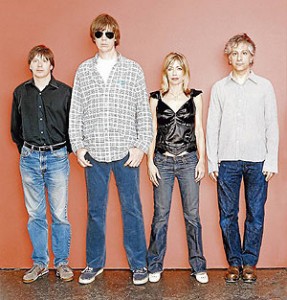album review: sonic youth, simon werner a disparu
What is there to say about Sonic Youth? Unless you started listening to them after getting Juno‘s soundtrack, you love them. The band are as big of a staple in the “indie rock” repertoire as Joy Division, the Yeah Yeah Yeahs, or maybe even The Velvet Underground.
The band has been making music for almost 30 years now (debut album Sonic Youth was released in March 1982). Their sound can be defined as art rock, noise rock, shoegaze, post-punk and experimental. In the late 90s, Sonic Youth started releasing highly experimental work via a self-started label called SYR. The ninth album off this label and most recent release is the entirely instrumental soundtrack for the May 2010 French thriller-drama Simon Werner a Disparu.
As a music reviewer, it’s rare to be asked to review a soundtrack. It’s even rarer to be asked to review an entirely instrumental album. While I was listening through the songs, I was sitting at the kitchen table in the house in which I grew up. It’d been a long time since I was sitting at the kitchen table with my mom on a weekday morning, but she asked me what I had on. As I am used to her knowing nothing of the kind of music I like, I said something snarky like “the new album by alternative mega-gods Sonic Youth,” to which she simply replied, “it has such a good feel to it, it’s like a soundtrack.”
Simon Werner a Disparu premiered at the May 2010 Cannes Film Festival and was met with general success. Now, although I consider myself to be lucky enough to live in one of the most culturally aware cities in the world, I had never heard of this film until I found myself listening to its soundtrack. That’s quite a strange way to begin a conversation about any work of art, but here we are.
Although I have yet to see the film, I can confidently write that the soundtrack does such a good job of conveying the mood with its various “Thème” songs for different characters and recurring melody that it mimics the plotline of any complex story.
The mostly-positive, at times haunting and always interesting recurring melody, first in “Les Anges au Piano”, matures in “Escapades” and then in “Thème de Simon”, gives the soundtrack a sense of coherence that reaffirms its position as more than an abstract album. The searing guitar riffs and piano-based accompaniment on these songs were more appealing to me than anything else on Simon Werner a Disparu. The highly experimental songs like “Dans Les Bois” distort the melody in a way that becomes hard to listen to, while the strictly piano-driven songs like “Jean-Baptiste et Laetitia” convey a haunting feeling.
The thirteen-minute track “Thème d’Alice” ends Simon Werner a Disparu on a relatively positive note. Acting as a kind of microcosm for the album and in turn, for the film, the song proceeds through a slow build-up relying on searing guitar riffs and rhythmic background drums. It sounds like any standard shoegaze or even dream pop song until the second minute, when more classically rock-and-roll guitar enters the mix. The way the instruments “talk to each other” here and continue throughout as this jam proceeds is something that marks all great instrumental songs, from the Allman Brothers’ “Jessica” to Sigur Rós’ “Untitled 2” to the Black Keys’ “Black Mud”. It’s interesting to hear how each separate element in the other “Thème” songs for the film’s characters collapse on each other in this final song to create something simultaneously so beautiful and hard to swallow.
Sonic Youth have always been experts at understanding their role as a major player in the art rock world, but the band has achieved something new with “Thème d’Alice” and more generally with Simon Werner a Disparu. “Thème d’Alice” is a perfect example of how truly postmodern this kind of album is. Its sound and ordering on the album allows the listener to quite easily make a reference to something he or she may very well have never even seen before. The track’s undoubted “experimentalism” allows you the time and space to realize that you didn’t see the movie, and while you’d like to, you know you have gotten something out of it nonetheless. You think.
Simon Werner a Disparu is out now on Woodsist/Remote Control Records.



Pingback: album review: ducktails, ducktails III: arcade dynamics
Pingback: album review: lower dens, twin-hand movement